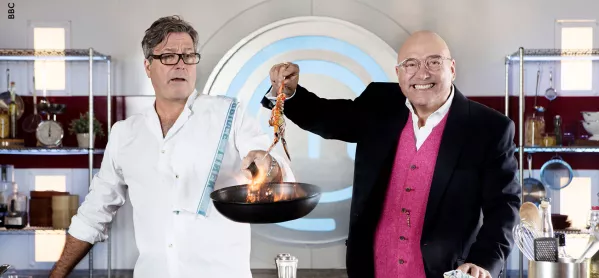
- Home
- Why education is like an episode of MasterChef
Why education is like an episode of MasterChef

MasterChef is back for the 10 millionth time. This month, it’s ordinary amateur cooks competing for the prize.
There are other incarnations: Celebrity MasterChef (who knew Greg Rutherford had such a light touch with pastry?) and my favourite - MasterChef: The Professionals - where a series of monosyllabic tattooed men who claim to be head chef in a gastropub are reduced to tears of shame over their inability to fold an omelette correctly.
I have a curious love-hate relationship with MasterChef. The sight (and sound) of Gregg Wallace roaring “WHOOAAR!” over a chocolate fondant is both compelling and disturbing.
John Torode is always to the point: “I don’t like it,” he’ll announce, as Kerry from Maidstone tentatively offers her brûlée surprise.
“It’s lumpy, bitter, curdled and burnt,” he’ll add, as Kerry - who’s used up all her annual leave to compete on the show - sobs bitterly into a tea towel.
Parallels with education
But most of all, over the years, I’ve recognised the parallels between MasterChef and education.
Think about it. If Gregg and John were SLT at your school, which one would you prefer to give you feedback on your lesson observation, or oversee your appraisal?
John may pride himself on plain-speaking, but Kerry is already aware her dessert is a disaster - she needs to know what to do to improve it. Gregg is at the very least enthusiastic.
Back in the day, lesson observations were conducted and assessed much like MasterChef entries.
As in a lesson, in MasterChef all can go well, but the slightest mistake can doom the hapless contestant to failure.
A complex meal
A lesson is a complex meal. Is the starter crisp? Does the main course have substance? Does the dessert leave them satisfied yet eager to come back for more?
How often, at the crucial moment, did your pedagogical soufflé fail to rise? Or did your injudicious use of seasoning scupper your chances of being rated “outstanding”?
Fortunately, in education at least, those days are gone, and snap judgements about “wow factor” no longer - I hope - exist.
It used to be that the first round in MasterChef was rather basic. On a good day, you could get through to the quarter-final by cooking a Welsh rarebit garnished with half a sausage and a cherry tomato.
But, over the years, the standard has risen. Now entrants arrive fully fledged, effortlessly turning out venison confit, tortellini from scratch or rabbit done three ways - which sounds to me dangerously like a 16th-century prostitution charge - in the first round.
There’s been a similar surge in standards in teaching. These days, even the rawest NQT would think twice before rocking up with a flimsy scheme of work about a day in the life of a boy band.
Instead, they discuss whether their PowerPoint presentation is cognitive-load friendly or earnestly share their tier 3 vocabulary. They’ve read Hattie and Rosenshine (or at least the tweets about them), and know that dual coding - despite what their cynical old battleaxe of a mentor says - is more than just sticking a picture on a worksheet.
Skills vs knowledge
There’s even an element of MasterChef that highlights, illustrates and exemplifies the old skills vs knowledge debate.
It’s the so-called skills test in the opening round of the professionals’ version. The resident celebrity chefs, Marcus or Monica, smugly whip up a classic dish for the benefit of the viewers.
Gregg keeps up an obsequious running commentary: “What’s that, Marcus? Parmesan? I like your style.”
Once the dish has been served, with a flourish, the contestants are required to reproduce it without instructions or seeing the finished product.
In my dream MasterChef/Gladiator-themed CPD session, this is where I’d pause the footage. I’d be hoping that teachers would be champing at the bit, because any educator worth their celery salt will have spotted this is no skills test - it’s knowledge, pure and simple.
No use being a whizz with the Sabatier, if you’ve never set eyes on a John Dory. It doesn’t matter how briskly you whisk that vinaigrette, if you’ve no idea that an artichoke can literally choke a diner. Nothing, in my opinion, reveals the misconception about the difference between skills and knowledge more clearly.
And, when a tear-stained alpha male shuffles from the MasterChef kitchen, defeated by his ignorance of îles flottantes, it makes me rage about everything that’s wrong with cookery competitions and education.
The current series has just started. There’s a new rewards system - in the form of MasterChef aprons - and Grace Dent, Jay Rayner et al sit in judgement like a kind of gastro Ofsted.
At times I will be infuriated, but I won’t give up on it. MasterChef? Education? Yeah…both.
Sarah Ledger has been teaching English for 33 years
Register with Tes and you can read five free articles every month, plus you'll have access to our range of award-winning newsletters.
Keep reading for just £4.90 per month
You've reached your limit of free articles this month. Subscribe for £4.90 per month for three months and get:
- Unlimited access to all Tes magazine content
- Exclusive subscriber-only stories
- Award-winning email newsletters
You've reached your limit of free articles this month. Subscribe for £4.90 per month for three months and get:
- Unlimited access to all Tes magazine content
- Exclusive subscriber-only stories
- Award-winning email newsletters



